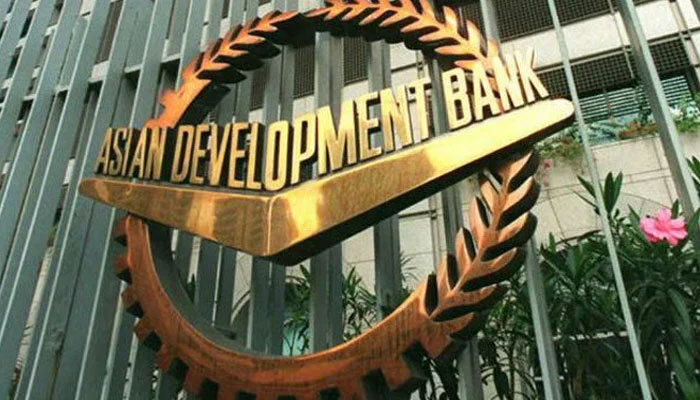ADB says Pakistan’s public debt around 80pc of GDP
ISLAMABAD: Amid rising public debt touching close to 80 percent of GDP, the Asian Development Bank (ADB) said on Wednesday that Pakistan’s overall recovery was still constrained by moderate confidence and high inflation eroding purchasing power.
In its forecast for Asian Development Outlook (ADO) for December 2023 update, the ADB said Pakistan’s public debt went up close to 80 percent of GDP for FY-2022.
Pakistan’s inflation rate, the ADB says, averaged 28.5% over July-October, but is expected to ease amid fiscal consolidation and monetary tightening, as well as the improved availability of food and key imported inputs. “Pakistan’s overall recovery is still constrained by moderate confidence and high inflation eroding purchasing power”, the report states. The ADB has raised its economic forecast for developing economies in Asia and the Pacific, after robust domestic demand drove higher-than-expected growth in the People’s Republic of China (PRC) and India. The regional economy is expected to grow 4.9% this year, compared with a previous forecast of 4.7% in September, according to the Asian Development Outlook December 2023 released on Wednesday. The outlook for next year is maintained at 4.8%.
The PRC’s economy is projected to expand by 5.2% this year, compared with a previous forecast of 4.9%, after household consumption and public investment boosted growth in the third quarter. The growth outlook for India has been raised to 6.7% from 6.3% following faster-than-expected expansion in July-September, driven by double-digit growth in industry. The upgrades for the PRC and India more than offset a lowering of the forecast for Southeast Asia, caused by lackluster performance in the manufacturing sector.
“Developing Asia continues to grow at a robust pace, despite a challenging global environment,” said ADB Chief Economist Albert Park. “Inflation in the region is also gradually coming under control. Still, risks remain, from elevated global interest rates to climate events such as El Niño. Governments in Asia and the Pacific need to remain vigilant to ensure that their economies are resilient, and that growth is sustainable.”
The region’s inflation outlook for this year has been lowered to 3.5% from an earlier projection of 3.6%, according to ADO December 2023. For next year, inflation is expected to edge up to 3.6%, compared with a previous forecast of 3.5%.
The growth outlook for Southeast Asia this year has been lowered to 4.3% from 4.6%, amid weak demand for manufacturing exports. The outlook for economies in the Caucasus and Central Asia has been raised slightly, while projections for Pacific economies are unchanged.
Risks to the outlook include persistently elevated interest rates in the United States and other advanced economies, which could contribute to financial instability in vulnerable economies in the region, especially those with high debt.
Potential supply disruptions caused by the El Niño weather pattern or the Russian invasion of Ukraine could also rekindle inflation, particularly regarding food and energy.
ADB is committed to achieving a prosperous, inclusive, resilient, and sustainable Asia and the Pacific, while sustaining its efforts to eradicate extreme poverty. Established in 1966, it is owned by 68 members, 49 from the region.
-
 Prince William, Kate Middleton Camp Reacts To Meghan's Friend Remarks On Harry 'secret Olive Branch'
Prince William, Kate Middleton Camp Reacts To Meghan's Friend Remarks On Harry 'secret Olive Branch' -
 Daniel Radcliffe Opens Up About 'The Wizard Of Oz' Offer
Daniel Radcliffe Opens Up About 'The Wizard Of Oz' Offer -
 Channing Tatum Reacts To UK's Action Against Andrew Mountbatten-Windsor
Channing Tatum Reacts To UK's Action Against Andrew Mountbatten-Windsor -
 Brooke Candy Announces Divorce From Kyle England After Seven Years Of Marriage
Brooke Candy Announces Divorce From Kyle England After Seven Years Of Marriage -
 Piers Morgan Makes Meaningful Plea To King Charles After Andrew Arrest
Piers Morgan Makes Meaningful Plea To King Charles After Andrew Arrest -
 Sir Elton John Details Struggle With Loss Of Vision: 'I Can't See'
Sir Elton John Details Struggle With Loss Of Vision: 'I Can't See' -
 Epstein Estate To Pay $35M To Victims In Major Class Action Settlement
Epstein Estate To Pay $35M To Victims In Major Class Action Settlement -
 Virginia Giuffre’s Brother Speaks Directly To King Charles In An Emotional Message About Andrew
Virginia Giuffre’s Brother Speaks Directly To King Charles In An Emotional Message About Andrew -
 Reddit Tests AI-powered Shopping Results In Search
Reddit Tests AI-powered Shopping Results In Search -
 Winter Olympics 2026: Everything To Know About The USA Vs Slovakia Men’s Hockey Game Today
Winter Olympics 2026: Everything To Know About The USA Vs Slovakia Men’s Hockey Game Today -
 'Euphoria' Star Eric Made Deliberate Decision To Go Public With His ALS Diagnosis: 'Life Isn't About Me Anymore'
'Euphoria' Star Eric Made Deliberate Decision To Go Public With His ALS Diagnosis: 'Life Isn't About Me Anymore' -
 Toy Story 5 Trailer Out: Woody And Buzz Faces Digital Age
Toy Story 5 Trailer Out: Woody And Buzz Faces Digital Age -
 Andrew’s Predicament Grows As Royal Lodge Lands In The Middle Of The Epstein Investigation
Andrew’s Predicament Grows As Royal Lodge Lands In The Middle Of The Epstein Investigation -
 Rebecca Gayheart Unveils What Actually Happened When Ex-husband Eric Dane Called Her To Reveal His ALS Diagnosis
Rebecca Gayheart Unveils What Actually Happened When Ex-husband Eric Dane Called Her To Reveal His ALS Diagnosis -
 What We Know About Chris Cornell's Final Hours
What We Know About Chris Cornell's Final Hours -
 Scientists Uncover Surprising Link Between 2.7 Million-year-old Climate Tipping Point & Human Evolution
Scientists Uncover Surprising Link Between 2.7 Million-year-old Climate Tipping Point & Human Evolution




